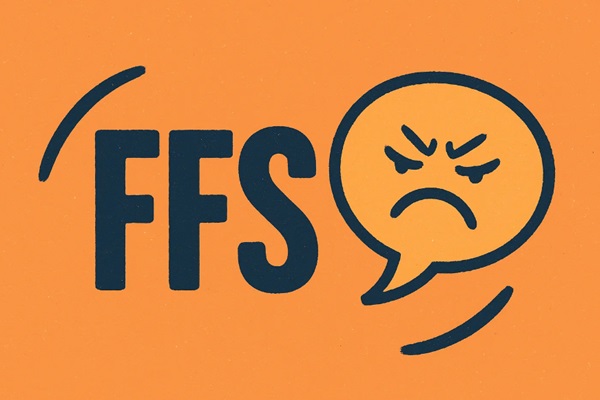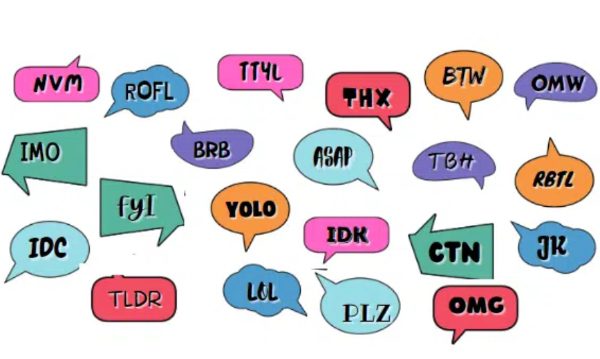Do you know what FFS means in slang? Sorting through the maze of online communication could feel the need to learn a new language, especially when people add acronyms and slang to the mix. Although often used casually, the meaning and emotional implications of this seemingly harmless abbreviation can vary depending on the context and intent.
This article presents an in-depth analysis of the meaning of FFS. We will explore its various contextual applications. The importance of learning such slang is particularly relevant for parents who want to stay informed about their kids’ digital communication trends.
What does FFS mean?
FFS is an acronym that stands for “For F***’s Sake” in the most widely used and well-understood context, according to the definition on Cambridge Dictionary. While it is a less strong form of a more direct expletive, the phrase is still somewhat rude.
Gen Z and Alpha use the slang to express frustration or impatience, usually after something self-evident, absurd, or totally foreseeable has just happened. This phrase is usually included in sentences when people complain about something, are annoyed by someone’s behavior, or a result that seems crazily infuriating.
Of note, though, either in capital letters FFS or lowercase ffs, are the same, may reflect on different degrees of intensity. Capitalized FFS may be a more forceful or even shouted tone.
Master the lingo your children may use and ensure their online safety.
How to use FFS in texting and social media?
As many people wonder about the FFS slang meaning, it is essential to understand how the tone and context vary across different platforms.



Casual text and chat applications
With informal messaging platforms like WhatsApp, Snapchat, and Discord channels, FFS is used as a brief expression of mild irritation towards friends or family. It is often used when talking about common frustrations and struggles.
Classic examples include:
- “So my phone died just before the meeting, ffs”
- “FFS, they moved the timeline again and haven’t bothered informing us.”
- “I missed my train by 30 seconds… ffs”
Gaming contexts
Gaming environments often intensify emotions. In multiplayer online games, FFS has a more extreme connotation. Players may use it in team chats when the game is under high pressure or during incompetent gameplay decisions.
- “FFS stop hurrying on your own!”
- “ffs this lag is killing me”
- “FFS, we had that one and wasted it.”
Social media posts and comments
On social media, such as Twitter, people often use ffs in response to news, a viral post, or what a public figure says. The acronym helps people maintain a certain degree of decorum, even when expressing intense emotions. This makes it appropriate for open discussions on almost every topic.
Social media illustrations.
- “ffs when will people learn to use their turn signals”
- “Another delayed flight… ffs why do I even bother to travel”
- “FFS all this could have been prevented with simple common sense.”
When is ‘FFS’ considered inappropriate?
The trick to knowing when not to use it. It is simply a matter of understanding the audience and the level of formality in the situation. Although most people widely accept FFS in informal online texts, it may be improper in certain formal and professional settings. This is largely due to the profane connotation of the term.
Noteably, it is unprofessional and impolite to use FFS in a work email, a professional group chat, a formal document, or brand-related content. Besides, older generations may also take offense to it, seeing it as a direct replacement of the full profane phrase.



Is ‘FFS’ offensive?
Assessing the offensiveness of FFS is complicated. To younger generations, the abbreviation is less offensive. People commonly use it to convey a mood with low stakes. And the sentiment behind the mood is more about exasperation rather than the actual expletive. But still, a large percentage of people, especially elders, consider it just as profane as saying F***.
Overall, whether or not FFS is offensive is entirely based on who you are talking to. The best rule of thumb is to expect that it could offend someone. Only use it with people with whom you are well acquainted and who communicate similarly to you.
Other FFS meanings beyond the slang
While most individuals are introduced to what ffs means as a slang phrase, the acronym also has other professional and technical meanings.
Context is what determines whether one is using ffs in a casual manner or formally. Some of the most common alternative meanings are as follows.
- Insurance – Fee-for-service. A system in which providers are paid on a per-service basis (e.g., tests, procedures). As opposed to on a flat rate basis.
- Advertising – Full Funnel Strategy. A marketing strategy that looks at the journey of the customer from awareness to conversion and finally loyalty.
- Medical Context – Facial Feminization Surgery. A series of surgical interventions aimed at transforming the facial look.
- Finance – Fund Financial Statements. Reports giving insights into the performance, financial health and compliance of a fund.
- Technology – Fast File System. A sophisticated file system is used on the Unix-based systems to enhance speed and efficiency.
Depending on the vocabulary used in the industry, the meaning completely changes. Therefore, context is vital, be it a business report, a medical paper, or an informal piece of text.
Related acronyms and slang terms
There are other shortened words that are used in a similar way to express various emotions, such as frustration, disbelief, or anger. They are frequently used in conjunction with or as an alternative to FFS in online communication.



Here are some of the most common ones.
- Oh My God (OMG). People employ it when surprised, shocked, or in disbelief. May be positive (OMG, that is amazing), or negative (OMG, not again…).
- WTF (What The F*). A louder, usually more profane statement of confusion, anger or disbelief. Just as intense as FFS, but more geared towards questioning a situation.
- SMH (Shaking My Head). Shows disappointment, disbelief, or mild annoyance but not with profanity. Commonly, a softer version of FFS.
- LOL (Laugh Out Loud). Mostly used in a humorous way, but occasionally used sarcastically when paired with FFS(“ffs lol, you done it again”).
- IDGAF (I Don’t Give A F*). Denotes indifference or rejection. People can use this after FFS to show annoyance.
All of these acronyms, whether lighthearted (LOL, OMG) or harsh (WTF, IDGAF), indicate how digital slang provides an emotional shorthand.
How to guide children and talk about proper slang use?
For parents, it is not only about decoding text to know what ffs mean. It is also about connecting to how children are exposed to diverse slang terms and online trends.
The rapidly evolving nature of online communications suggests that knowing slang is a crucial component for effective online communication. For parents, it’s helpful to close the generational gap.
Here are some tips for parents on discussing online activities and slang use with children.
- Be curious, not critical. Ask your child what some of the acronyms mean rather than labeling them as bad. This maintains open communication.
- Teach context is important. Inform them that slang, such as FFS, may be acceptable during an informal conversation with a friend. But not in a school assignment or conversation with an adult..
- Role model decent language. Offer alternatives for expressing anger without resorting to profanity.
- Be in the know and active. Take an actual interest in their virtual world. Ask them to educate you on new slang, viral memes and trendy apps.
For parents with concerns about their children’s online safety, a trustworthy parental control tool can be a great assistant in modern parenting and guidance.
Parental monitoring with FlashGet Kids



One such application is FlashGet Kids. This app provides you with comprehensive features to ensure a safer digital world for your child, without having to constantly monitor or violate privacy.
Its features directly respond to the issues from the use of slang to further online behaviors. Features you will get:
- App tracking and blocking: Keep an eye on the social, game, and chat apps your child installs on their mobile device, and which ones they spend the most time on. If needed, you can remotely block access to specific apps and prevent new downloads.
- Sync notifications: Keep track of your child’s text messages, checking for flagged words. This is to help parents gain insight into whether slang terms like FFS are being used in inappropriate settings.
- Keyword detection and alerts: This setting could be set to inform you about certain activities or toxic messages. You could then be aware of potentially troubling behaviors immediately.
- Daily usage repots: Gives a breakdown of your child’s digital habits, which assists parents in managing their child’s phone use.
With open communication and careful utilization of FlashGet Kids, parents can form a safe and conducive environment to guide children through the challenges of the online world.
Final words
To conclude, learning what ffs mean is not limited to learning that this is an abbreviation of the phrase For F*** Sake. As we’ve seen, FFS can have varying meanings in the contexts of texting, gaming, and social media, while also having professional definitions in other disciplines.
Context, your audience, and digital etiquette are important considerations to make when deciding whether to use it and how.
For parents, knowledge of such slang will enable safer discussions and more informed advice. Ultimately, curiosity and awareness are the keys to navigating the evolving landscape of online communication responsibly.

